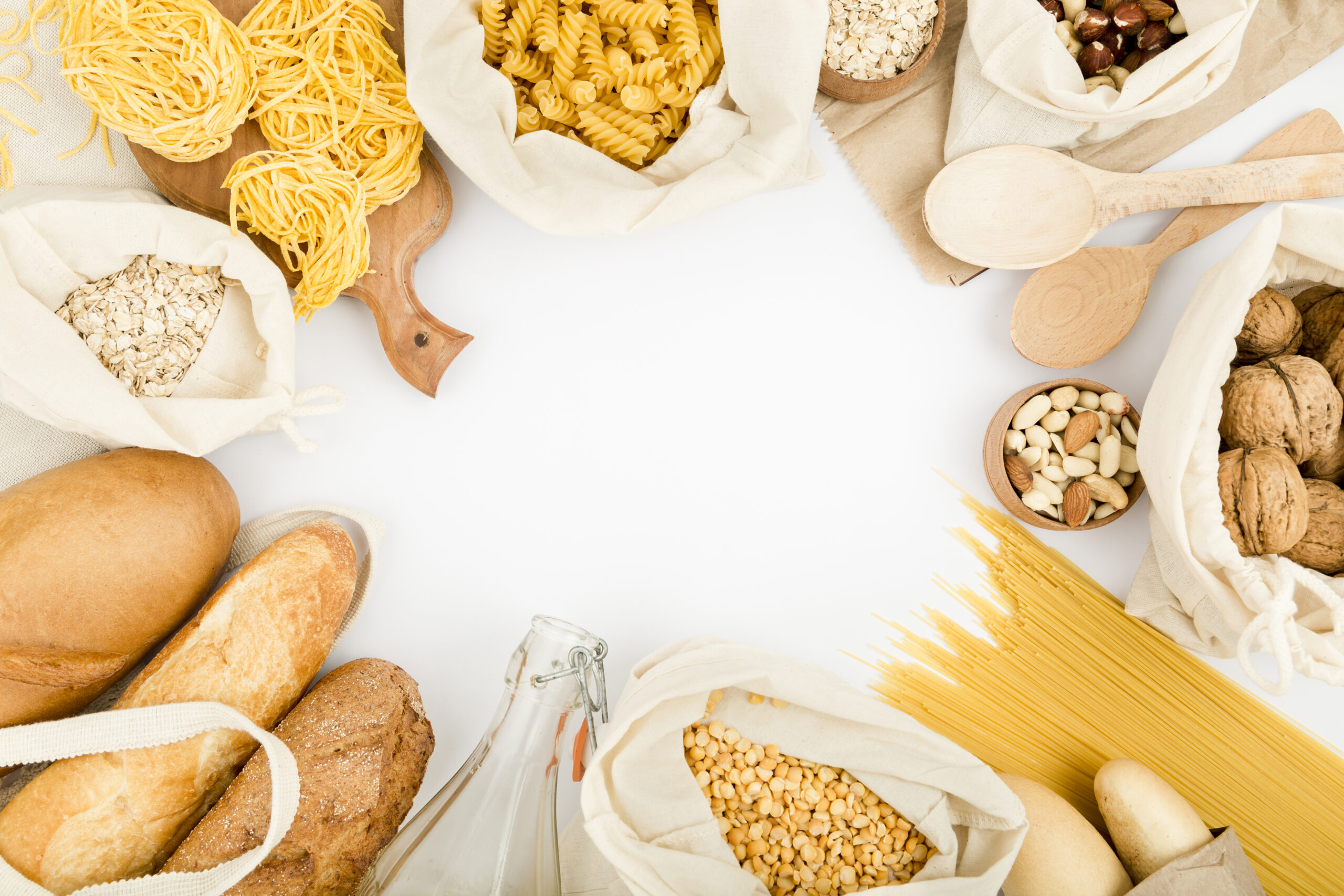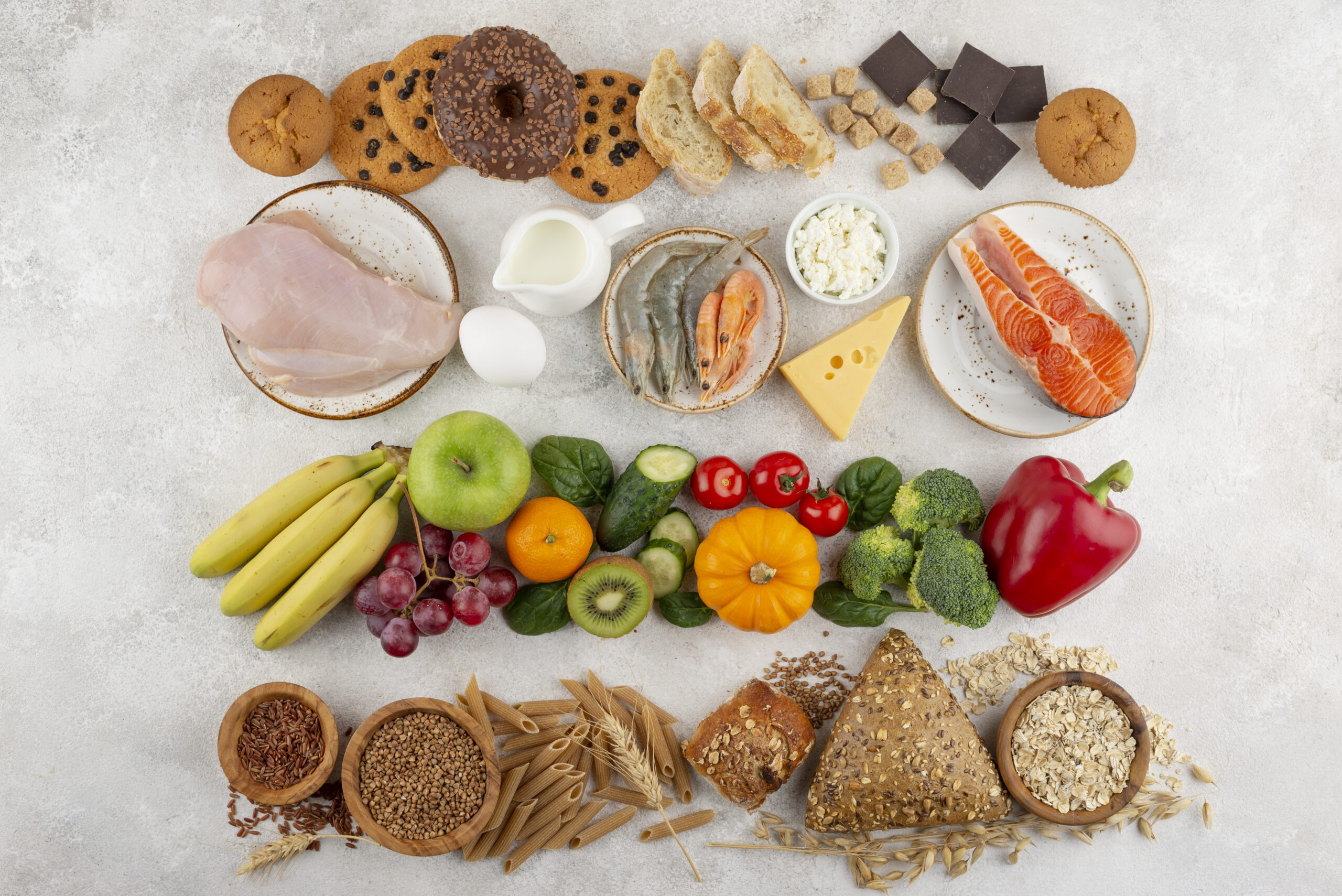Carbohydrates, simple and complex, commonly referred to as sugars, are compounds of plant origin. From a nutritional standpoint, they are digestible and indigestible. The former includes fructose and starch, while the latter encompasses fiber composed of cellulose and pectin, exerting a beneficial influence on the digestive system.
The term sugars or carbohydrates refers to digestible carbohydrates. Inadequate sugar intake from food (less than 100g/day) leads to incomplete oxidation of fatty acids, resulting in the generation of ketone bodies that contribute to the body's acidification. Carbohydrate deficiency in the diet significantly disrupts vital life processes.

Carbohydrates![]() are created by green plants from carbon dioxide and water during photosynthesis. They act as energy sources and as crucial structural elements in organisms. In addition, part of the structure of nucleic acids, which has genetic data, consists of carbohydrates.
are created by green plants from carbon dioxide and water during photosynthesis. They act as energy sources and as crucial structural elements in organisms. In addition, part of the structure of nucleic acids, which has genetic data, consists of carbohydrates.
Carbohydrates are a primary energy source, with approximately 4 kilocalories of energy produced per gram when metabolized.
In dietetics, we often talk about good and bad carbohydrates. The specialists divide the sugar supply to the body into two groups.
Simple sugars![]() (monosaccharides) are “bad” carbohydrates. Their single-molecule structure makes them easily absorbed by the body, which is why products containing them are high in calories.
(monosaccharides) are “bad” carbohydrates. Their single-molecule structure makes them easily absorbed by the body, which is why products containing them are high in calories.
Simple carbohydrates include:
“Good” carbohydrates are complex sugars![]() , which are made of at least two monosaccharides (simple sugars).
, which are made of at least two monosaccharides (simple sugars).
The digestive system finds it more difficult to absorb complex carbohydrates. The body must work hard to produce energy from them or process them and store them as fat tissue.
That is why products that contain complex carbohydrates do not make you fat so much. These are mainly grains, whole grain products, and legumes. Complex carbohydrates primarily perform storage and structural functions.
Disaccharides![]() are substances composed of two molecules of simple sugars linked together. Specialists distinguished three primary disaccharides: sucrose, lactose, and maltose.
are substances composed of two molecules of simple sugars linked together. Specialists distinguished three primary disaccharides: sucrose, lactose, and maltose.
Polysaccharides![]() are the condition in which most natural carbohydrates appear. Polysaccharides contained in multiple molecules of one sugar or sugar product are named homopolysaccharides. They are formed of glucose (that includes glycogen and starch – the storage carbohydrates of animals and plants, and cellulose, the significant structural element of most plants).
are the condition in which most natural carbohydrates appear. Polysaccharides contained in multiple molecules of one sugar or sugar product are named homopolysaccharides. They are formed of glucose (that includes glycogen and starch – the storage carbohydrates of animals and plants, and cellulose, the significant structural element of most plants).
Remember that carbohydrates start to break down in the mouth with the help of the enzyme found in saliva called salivary amylase![]() ; it only works under alkaline conditions, with the optimal pH being 6.0-7.0.
; it only works under alkaline conditions, with the optimal pH being 6.0-7.0.
Starch is transformed into maltose, maltotriose, and dextrins at this stage. Upon entering the stomach, the food encounters an acidic environment, which deactivates the salivary amylase. Only partial breakdown of disaccharides like sucrose and maltose occurs in the stomach. Further carbohydrate digestion is in the small intestine.
In the duodenum, this digestion takes place with the participation of pancreatic α-amylase —carbohydrates are hydrolyzed to dextrins and disaccharides. Intestinal juice contains the enzymes glucoamylase and glycosidases, as well as lactase, sucrase, and maltase, which digest carbohydrates into simple sugars.
The absorbed simple sugars enter the liver in the bloodstream. Most hexoses are converted into glucose in the liver; some enter the bloodstream, some are oxidized in the liver, and some are stored as reserve glycogen.

Carbohydrates perform many functions![]() in the human body that are important for life and health.
in the human body that are important for life and health.
Functions of carbohydrates in the human body:
In situations of malnutrition and highly restrictive restriction of carbohydrates in the diet to survive, the body looks for alternative ways of transporting glucose to the body cells. It begins to use up other energy reserves, such as muscle and liver glycogen reserves.
It can also obtain energy from the metabolism of ketone bodies (ketosis). However, this state is not recommended due to the natural physiological adaptation of drawing energy fuel from complex metabolic processes from saccharides.
With an insufficient supply of carbohydrates in the diet, gluconeogenesis occurs.
Gluconeogenesis![]() is the enzymatic process of converting non-sugar precursors into glucose. This process takes place in liver and kidney cells. The substrates are non-sugar compounds, such as amino acids, lactate, or glycerol.
is the enzymatic process of converting non-sugar precursors into glucose. This process takes place in liver and kidney cells. The substrates are non-sugar compounds, such as amino acids, lactate, or glycerol.
Thanks to gluconeogenesis, the body can produce glucose even when its supply, both from food and from the breakdown of glycogen reserves, is insufficient. Please remember that glucose is necessary for the proper functioning of the brain and red blood cells and is significant in the metabolism of other cells.
Gluconeogenesis is particularly important during periods of starvation or intense exercise because the brain and erythrocytes use almost exclusively glucose as an energy source.
Good sources of carbohydrates![]() are primarily wholemeal plant products (bread, rice, groats), vegetables, and fruit. These products provide valuable sugars and vitamins to the body.
are primarily wholemeal plant products (bread, rice, groats), vegetables, and fruit. These products provide valuable sugars and vitamins to the body.
Eat vegetables (radishes, tomatoes, lettuce, peppers, cucumbers, cabbage) because despite their low energy content, they have high nutritional value. Eating vegetables means that our body receives a lot of significant substances and few calories. Therefore, it is an ideal solution for people who want to lose extra kilos.
Fattening carbohydrates are in products with a high glycemic index:
Carbohydrates are essential to a nutritious diet and supply multiple significant nutrients. However, not all carbohydrates are equally beneficial for the individual.
Here's how to make nourishing carbohydrates function in a balanced diet:
If you want to see if you have diabetes, you can undergo a panel of diagnostic tests. The results will show whether the indicated symptoms were related to increased blood sugar.
It is impossible to eliminate carbohydrates from your diet. The body cannot function without sugars, so it converts other compounds into glucose when they are missing in the organism. It is done at the expense of proteins and fats. It is a very unfavorable phenomenon because proteins are necessary to build tissues.

Most foods and food groups contain carbohydrates, so specialists advise finding the right balance. An average, healthy individual eats carbohydrates with each meal throughout the day.
Consume carbohydrates earlier to lose weight or improve blood sugar levels. Most individuals are active earlier in the day and have a more sedentary lifestyle at night. That is why having the biggest portion of carbs in the evening can cause a blood sugar spike. Then, the organism keeps the extra glucose that it did not use for energy as fat.
Moreover, if people exercise in the morning for more than an hour or are endurance athletes, they may require a small pre-workout snack. For example, carbohydrates help you refuel after training.
Eating carbs at dinner may impact sleep – it may happen if the person goes to bed while the food is still digesting.
Consume the appropriate type of carbohydrates to acquire the energy-fueling advantages. Specialists advise that eating sugary and processed foods can quickly heighten blood sugar. As a consequence, a person can feel hungry just a few hours later. The same can occur if you eat solely carbohydrates and do not get adequate protein and fat.
There is no specified amount of suggested daily carbohydrates. The person's age, sex, medical conditions, training level, and weight plans all influence the amount that is suitable for them.
For most individuals, specialists advise a nutritious plate approach. Serve:
Not enough carbohydrates can cause a variety of health problems. Without enough fuel, the body does not receive energy. Additionally, the central nervous system suffers without enough glucose, which can cause dizziness or mental and physical weakness. Low blood sugar is called hypoglycemia.
When blood sugar levels drop, defense mechanisms are most often triggered, i.e., the secretion of hormones that act antagonistically (inversely) to insulin. The alpha cells of the pancreatic islets are stimulated to release glucagon, and the sympathetic nervous system is stimulated to release adrenaline. At the level of the central nervous system and hypothalamus, the pituitary gland is stimulated, and growth hormone and hormones that stimulate cortisol secretion are increased.
To distinguish between high- and low-carbohydrate diets, according to the data presented by specialists, a high-carbohydrate diet is characterized by a saccharide intake of more than 230 grams per day or an energy share in the diet of at least 45%.
So far, a relatively large number of scientific studies have been published that verified the impact of a low-carbohydrate diet on reducing stored fat tissue in obese or overweight people. Limiting the consumption of saccharides can undoubtedly lead to the loss of stored fat. This view is confirmed by the results of numerous published scientific works, including those presented relatively recently.
It also seems that following a well-composed low-carbohydrate diet is safer. Confirmation is the Mediterranean diet with a low supply of carbohydrates, which improves blood lipid parameters, reduces fasting glucose and insulin levels, and reduces selected indicators of the intensity of the inflammatory process in the body (TNF-α, individual interleukins).
It is worth emphasizing, however, that the health benefits mentioned were not observed in all participants taking part in the research and choosing this way of eating. It may be related to individual genetic conditions, the qualitative and quantitative food selection, and the duration of compliance with the selected diet.